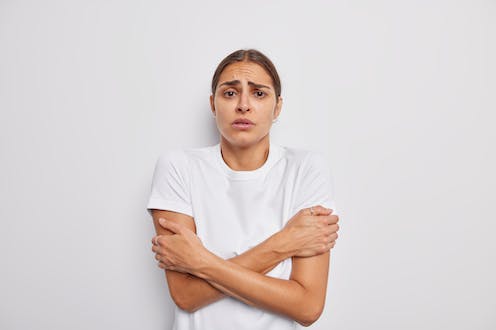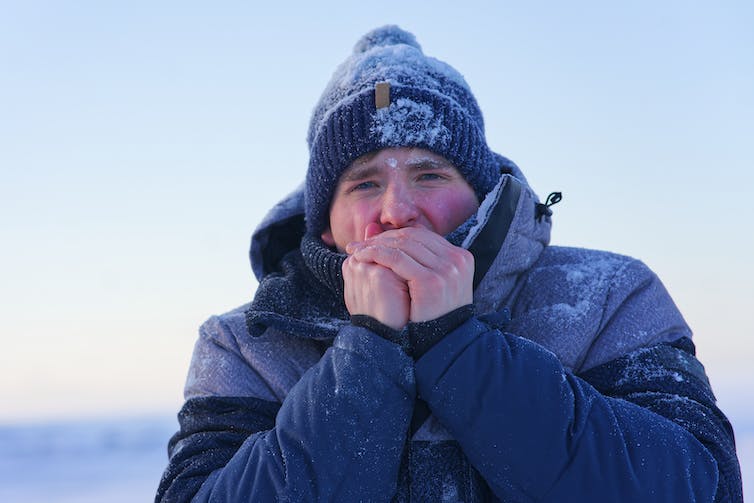
Pret a Manger, a sandwich and coffee chain, was handed an £800,000 fine recently after one of its employees became stuck in a walk-in freezer. The employee was trapped in the -18℃ freezer for two and a half hours before being found. Reports suggest the employee displayed symptoms of hypothermia as a result.
Pret has reportedly apologised and said it is working with the manufacturer to ensure this doesn’t happen again.
This is not the first instance where an employee has become locked in a walk-in freezer – with a 2022 US case sadly resulting in death from hypothermia.
Extreme cold temperatures are no joke. It only takes a short amount of time in the cold for the body to be seriously affected.
The body’s normal temperature is about 37℃. When the body deviates from this temperature, it’s either because it’s fighting an infection (causing temperature to rise) or because it’s been exposed to cold.
One of the body’s first responses to a temperature drop is to undergo a process called vasoconstriction. This reduces blood flow to exposed areas – such as fingers and toes – by narrowing the diameter of the blood vessels. This process helps maintain core body temperature, which keeps vital organs functioning. In temperatures below -4℃, vasoconstriction also prevents ice crystals from forming in the blood.
When core temperature drops below 35℃, hypothermia occurs. This means the body is unable to produce enough heat to keep up with the rate it’s being lost.
In the case of the Pret employee, they were only wearing jeans and a T-shirt in a -18℃ environment. Since most body heat is lost through our skin and when we exhale, even just a few minutes in this environment would lower body temperature and cause hypothermia to set in.
Hypothermia has three stages.
In the mild stage, body temperature drops to between 32 and 35℃. The heart beats faster, breathing rate and blood pressure increase and muscles become tense from shivering. This all happens to generate heat. You may also need to urinate more often, as the body diverts blood to the kidneys. Confusion and reduced coordination may also happen.
In the moderate stage, body temperature drops to between 28 and 32℃. By this stage all body functions begin to slow and shivering ceases.
In the severe stage, body temperature drops below 28℃ and most body systems stop functioning. Most will be unconscious by this stage. Heart function deteriorates and the lungs lose function as they become congested with fluid due to the lack of blood circulation.

EugeneEdge/ Shutterstock
Research suggests that for every 5℃ drop in temperature, there’s a 1.6-fold increase in the risk of injury or death. There’s no exact information on how long a person can survive in a walk-in freezer, but based on information from past cases it could only be a matter of hours. Modelling also predicts a healthy man could survive naked in -20℃ for two and a half hours. This is extended to around 15 hours when wearing two layers of clothing.
Dangers of the cold
Hypothermia is so dangerous because it progresses gradually, with the sufferer becoming unaware and confused. This confusion, brought on by the temperature drop, leads to a decline in brain function.
In some cases of hypothermic death, people have been found naked or hidden in small, enclosed spaces (known as terminal burrowing) in an attempt to keep warm. Removing one’s clothes, termed paradoxical undressing, happens in the final stages of hypothermia. It’s caused by the blood vessels opening one last time to push blood into tissue to warm them. This causes people to become extremely hot.
Hypothermia commences quicker in water as it conducts heat away from the body 25 times better. Body size and shape can also affect how quickly hypothermia commences. Surprisingly, people with higher body fat are more likely to develop hypothermia. This is because they have an increased body surface area to lose heat, and less muscle mass to generate heat through shivering. Women also develop hypothermia faster than men.
Although hypothermia due to cold air takes longer, air movement can cause it to set in faster. This is because continually moving air shifts the body’s warmth away from the skin’s surface.
There’s also the risk of tissue damage from frostbite from cold exposure. At -18℃, frostbite happens in as little as 30 minutes. Frostbite is the freezing of the skin, which progresses to deeper tissues if cold exposure continues. This results in tissue death and can lead to loss of fingers and toes.
Movement can be beneficial in the early stages of frostbite. But as hypothermia sets in this can be counterproductive as it circulates blood from the cold limbs back to the core, risking even greater body temperature drops. Movement during moderate or severe hypothermia can increase the risk of death due to this rush of cold blood to the core.
Hypothermia is treated through rewarming. For people with mild hypothermia, removing them from the cold, taking off any wet clothing and giving them extra layers to warm up usually helps. Offer them warm food or drink to give them energy to generate heat through shivering.
People with moderate or severe hypothermia will require heat from an external source as their body isn’t able to generate heat. This can be provided in the form of external warmth, such as chemical heat packs, applied to the head, neck or torso. In extreme cases, warmed saline may need to be inserted into body cavities. Be wary of applying heating pads to limbs or immersing the person in warm water, as this may burn the skin or increase the risk of death from cold blood rushing to the core.
It’s unlikely you may find yourself trapped in a freezer. But should you ever find yourself in a situation where hypothermia is a risk, your best bet for slowing its progression is layering clothes (or other materials you can find) to help trap the body’s heat.
![]()
Adam Taylor does not work for, consult, own shares in or receive funding from any company or organisation that would benefit from this article, and has disclosed no relevant affiliations beyond their academic appointment.























